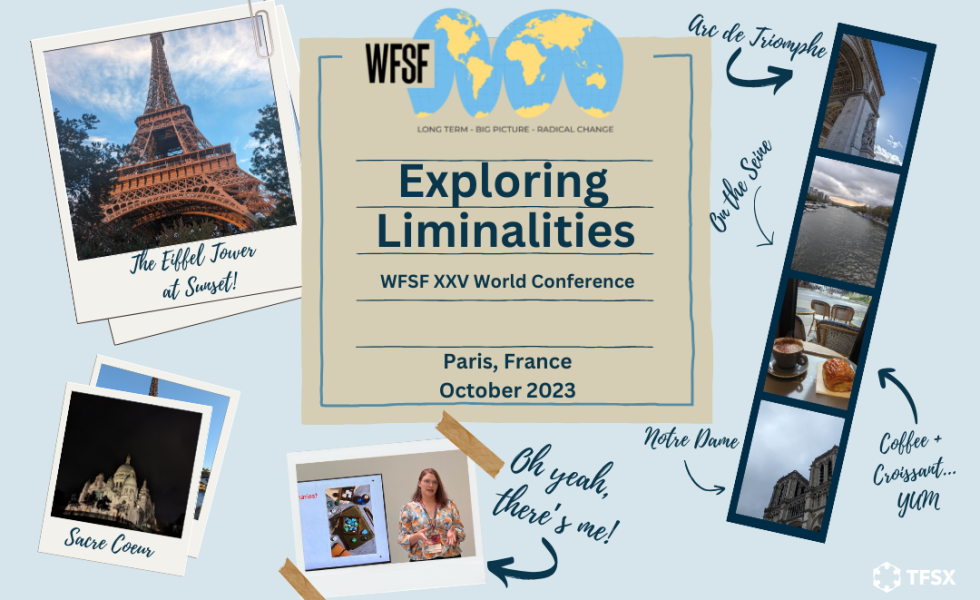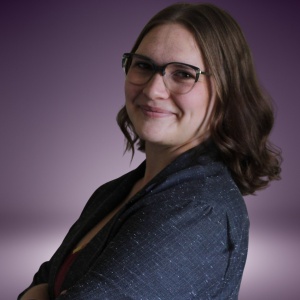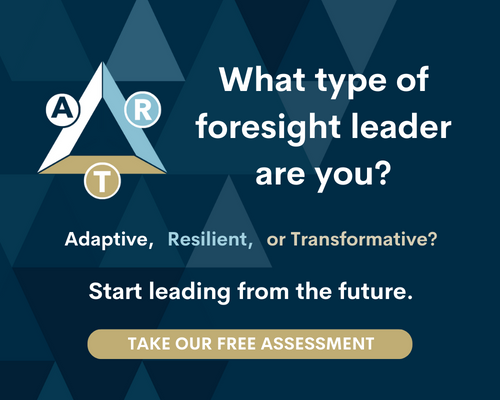Emily In Paris: Exploring Liminalities With The World Futures Studies Federation World Conference

This October, I had the incredible opportunity to attend and speak at the WFSF’s Global Conference in Paris. Although I had previously attended several smaller foresight events, this was my first time experiencing such a large collection of futurists from around the world. It was an absolutely incredible experience in which I had the opportunity to learn and speak with some amazing people. Here are my takeaways from the event:
The Best Conversations
- Would you like to be immortal?
- Several presentations at the conference sparked debate over the future of death and aging. If it was possible to halt the effects of time on our bodies, to “cure” us of the aging process, how would we shift our idea of what it means to be alive? What could we do with our potentially limitless lifespans? And what new problems would we face in a world where the population never ages?
- While the majority of people claimed they would not pursue immortality if given the option, the few who sought to live forever were passionate and vocal about their beliefs. I found myself questioning my own answer multiple times over the course of the week, as new viewpoints were brought up on both sides of the conversation. It was a fantastic exercise in opening my mind to alternate perspectives and re-evaluating my own beliefs.
- What does it mean to be human?
- Over the course of the week, I participated in multiple iterations of a debate around a modern Ship of Theseus problem: How much of a human can you replace with technology before they can no longer be considered human? Are there specific parts of the body vital to maintaining our humanity, such as the heart or the brain? And if these organs are removed and placed into a cybernetic body, does that body become human? How many human parts must be placed into a cybernetic body before we are willing to call it human?
- This was a fascinating conversation for understanding the different ways people view the world. I think I was most surprised when a colleague informed me that it wasn’t the heart or the brain that makes us human, but the stomach. It was incredible to see the differing perspectives from futurists around the globe, and I learned so much from each and every one of them.
The Key Takeaways:
- It’s not always about what you learn, it’s about the people you meet and the bonds you form.
- Do I remember the content of most of the talks I attended? Not unless it was particularly provocative. But do I remember the people I met and conversations we had? Absolutely. The WFSF conference was an incredible opportunity for me to meet other futurists, and strengthen my friendships with those I already knew. Those bonds will be infinitely more valuable to me moving forward than a statistic about AI or a thesis on liminality.
- Presenting at a global conference isn’t as scary as I thought it would be, but even the experts get nervous.
- I went into the conference full of nerves, certain that I would spend the four days before my workshop hearing from the kind of experts who hadn’t felt anxious about their work in years. What I discovered talking to people throughout the week was that almost everyone felt nervous to some degree, whether it was the thought of presenting before an unfamiliar audience, the stress of traveling, the anxiety of mingling with a large group of strangers, or something else. After hearing that I wasn’t the only one overcome by nerves, it was much easier to feel confident when it was finally my turn to present.
- Everyone starts somewhere – it never hurts to try
- Early in my futures journey, a mentor gave me a piece of advice that quickly became a mantra for me: “Make your own opportunities.” She went on to elaborate by saying that we all have to start from somewhere, so it never hurts to try to create those opportunities to start. I could have let myself be overcome by the self-doubt, thinking there was no way my workshop proposal would be selected, but I chose to try anyway. I created my own opportunity to give myself a global platform, and now that I have begun, it can only get easier from here. The same goes for anyone – keep trying to make those opportunities, and eventually you’ll find yourself on the path to your goals.
- The Eiffel Tower will take longer than you think
- You may see a relatively short line at the base of the tower and think “I can get through this quickly!” But you’re wrong. There’s another line. And another line. And another one. There are lines to get to the top of the tower, and lines to get back down. So if you’re planning on going up to the top, don’t think you can do it in 30 minutes or less. That being said, if you have the time, it’s absolutely worth it. The view from the top is incredible.

Emily Mudge
Marketing and Experiences Coordinator, TFSX
Emily comes to the TFSX team with a passion for writing, storytelling, analytics and research. She graduated with a BA in Journalism and a BA in History from Arizona State University, and has since received additional certificates in foresight from both IFTF and the University of Houston.

